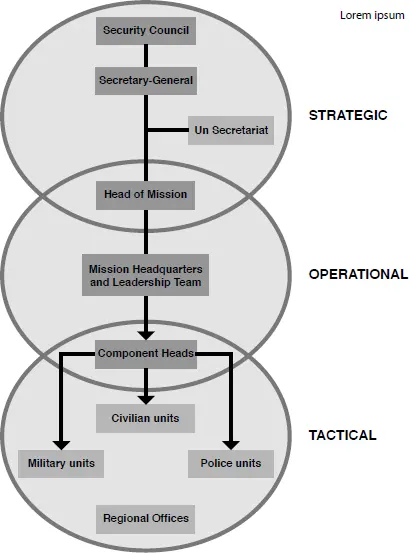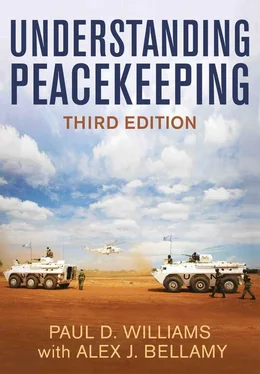operational level: refers to the debates and decision-making that take place at the level of the particular operation, usually as a result of dialogue between the mission’s senior leadership team and the authorizing international organization;
tactical level: refers to the debates and decision-making that take place within specific components and contingents in a particular operation, usually as a result of dialogue between component heads and national contingents or units (such as a force commander and the commander of a national contingent).
These levels are illustrated for UN peacekeeping operations in figure 2.3.
2.2 States as peacekeepers
Peace operations are sometimes initiated and led by states. Usually, they act as part of a multilateral coalition but on rare occasions they act alone. Pivotal states initiate, lead and provide a significant material contribution to a peace operation, which may or may not be authorized by an international organization. Often, the material contribution made by other members of the coalition or organization is insubstantial. This means pivotal states generally try to form coalitions in order to enhance the legitimacy of these operations rather than to share the material burdens (Coleman 2007).
The motives that influence states to provide peacekeepers are discussed in more detail in chapter 12. Here, we’ll just note four generic reasons why states might want to conduct peace operations outside of an international organization. First, regional hegemons might want to press their own claims to territory, economic benefits or access to natural resources, or to support the socio-political ambitions of allies. Often, such hegemons also have a vested interest in maintaining regional order and the prevailing regional status quo. Russian peacekeeping and mediation through the CIS in Abkhazia/Georgia and Nigerian peacekeeping through ECOWAS in West Africa provide good examples of regional hegemons acting as pivotal states initiating and leading peace operations to maintain regional order. This type of peacekeeping may be a thinly veiled attempt to secure the hegemon’s national interests. In Moldova in 1992, for example, some 12,000 troops from the Russian 14th Army were deployed to the breakaway republic of Transdnestr as part of a so-called disengagement force. In reality, the troops acted to buttress the Transdnestrian secession (McNeill 1997: 99). In more positive terms, regional hegemons have an interest in maintaining order in their neighbourhood, and they are by definition more militarily capable than their neighbours and therefore may make effective peacekeepers. Regional hegemons should also have a good understanding of the dynamics of the conflict they are trying to manage, though they are also more likely to have an economic and political interest in the outcome of the conflict.

Figure 2.3 Authority, command and control in multidimensional UN peacekeeping operations
Former colonial powers that continue to have close economic, political and social ties with their former colonies may also conduct peace operations. For example, French troops garrisoned in Côte d’Ivoire acted as peacekeepers after the outbreak of civil war there in 2002. Alternatively, Britain’s Operation
Palliser, deployed to Sierra Leone in 2000 in support of President Kabbah’s government and the beleaguered UN operation UNAMSIL, stemmed from a mixture of motives, but a sense of attachment resulting from the former colonial relationship was one of them (Williams 2001). Former colonial powers may be motivated by the desire to support elected or friendly governments, help maintain regional order, protect perceived economic and political interests, support humanitarian concerns, or protect significant communities of nationals from the metropole.
Concerned neighbours are a third category of state that might conduct unilateral operations or act as a pivotal state when war, economic collapse and/or massive human rights abuse occur in their own ‘backyard’ (James 1990). They may be prompted to act by concerns about negative spillover effects as well as regard for the welfare of neighbouring populations. For instance, the Italian-led operation in Albania in 1997 was prompted by the desire to stem the flow of Albanian refugees into Italy, a perceived need to restore regional order, and humanitarian concerns (Bellamy 2002a: 64). Similarly, Australia acted as a pivotal state in creating the INTERFET mission to East Timor in 1999, primarily because of domestic pressure to do something to protect an endangered population near Australia’s borders.
Finally, great powers might act unilaterally or as pivotal states in initiating and leading peace operations. For instance, in 1982, Israel’s refusal to allow the UN to supervise the withdrawal of PLO forces from Beirut persuaded the Americans to seek alternative options, and it was the US that acted as a pivotal state in the creation of the multinational force deployed to Lebanon (Diehl 1994: 58–60). In this case, the US was prompted to act to maintain stability in a distant region out of concerns for global order and the threat of violent escalation that was carried by the Middle East conflict, as well as to secure its own interests in the region.
2.3 International organizations as peacekeepers
Although we analyse regional peace operations in greater detail in chapter 13, it is useful briefly to highlight some of the central issues here. International organizations have initiated the majority of peace operations. While the UN has authorized the most, regional arrangements have become increasingly involved in this area, particularly since the end of the Cold War. Chapter VIII of the UN Charter encourages regional arrangements to resolve conflicts peacefully within their region, as long as they keep the Security Council informed about their initiatives. But Chapter VIII also states that regional arrangements are not permitted to engage in peace enforcement without explicit authorization from the UN Security Council. This has not stopped some regional organizations, including ECOWAS and SADC, doing precisely that.
International organizations have conducted peace operations in part because they have considerable functional and normative advantages over unilateral action (see Claude 1966; Abbott and Snidal 1998; Barnett and Finnemore 2004; Coleman 2007). In relation to peacekeeping, international organizations can play at least five positive roles.
1 They help to set the rules for the peacekeepers themselves. Contributing states should work within the organization’s agreed rules and to the mandate it provides.
2 They may provide greater accountability than unilateral actions or coalitions of the willing and offer a forum for galvanizing support and coordinating action in response to crises.
3 They maintain bureaucratic structures to manage field operations and often possess internal procedures for auditing operations.
4 In cases where the host state for the operation is also a member of the organization in question, there may be a greater inclination to accept its involvement than that of a strong regional hegemon or coalition of states.
5 International organizations may have collective institutional memories based on past experiences that can influence the development of peacekeeping norms.
However, international organizations also confront several shortcomings that may undermine their normative and functional potential. First, peacekeeping under the auspices of an international organization does not necessarily confer legitimacy on an operation. It also depends upon the organization, the historical context and the nature of the intervention itself. Second, the cost of accountability may be cumbersome decision-making processes and bureaucratic structures that are ill-suited to conducting and managing complex operations (Esman 1995: 43–7). Third, regional organizations vary considerably, not only in terms of their membership, purpose, bureaucratic structure and legitimating function but also in terms of their capabilities, role and moral standing (Acharya and Johnston 2007).
Читать дальше













